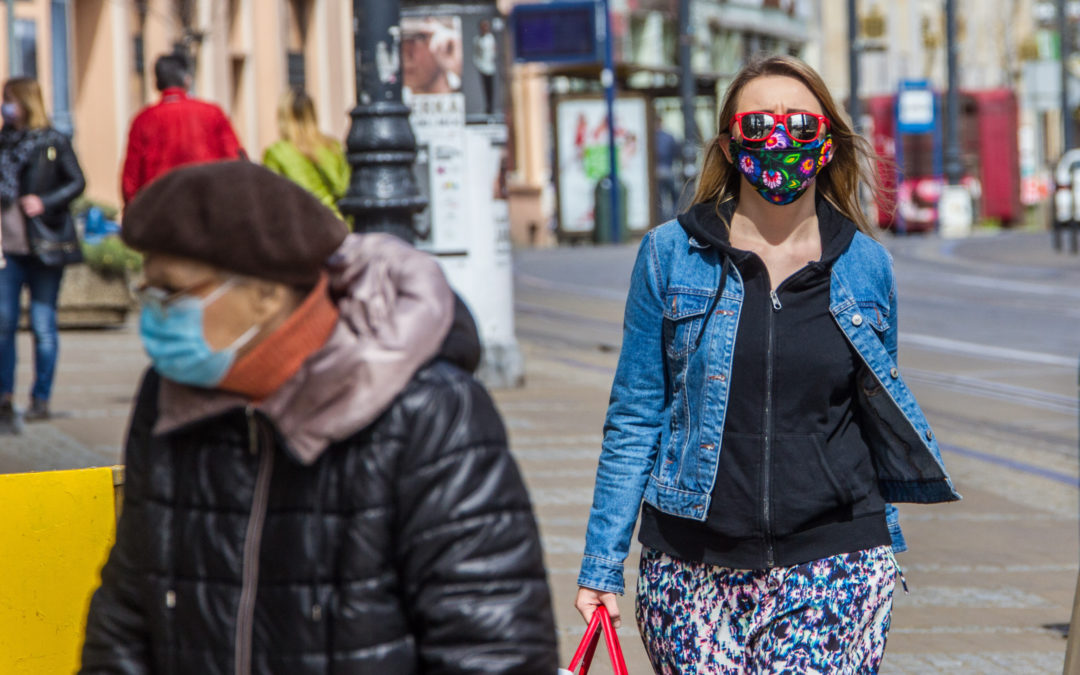A picture of how Poles have reacted to the coronavirus pandemic has been provided by research from the University of Social Sciences and Humanities (SWPS) in Warsaw.
Their polling, conducted on behalf the university’s Centre for the Study of Democracy between 9 and 16 April by research firm PBS, finds that the Polish public generally think that the government has done a good job tackling the pandemic, while also being broadly satisfied with the EU’s response.
There is, however, strong opposition to the ruling party’s plans to go ahead with presidential elections in May. A large majority also disapprove of the behaviour of the party’s leader, Jarosław Kaczyński, during commemorations of the Smolensk disaster, when he appeared to act in contradiction of the government’s own restrictions designed to mitigate the epidemic.
Almost half of the respondents believe that “foreign powers are deliberately contributing to the spread of the coronavirus”, which is more than the proportion who think the pandemic’s development is due to “natural processes”. The researchers were surprised by this strong belief in a conspiratorial view.
Finally, the study shows how Poles feel about the crisis’s impact on their financial situation, as well as the extent to which they believe the virus is a danger to their health.
Assessing the official response
Asked about the actions of the government, which introduced tough and early measures to mitigate the spread of the virus, half of respondents said that Prime Minister Mateusz Morawiecki is “reacting appropriately”.
A third of respondents thought the government is not doing enough, while another 17% said that he is “overreacting, spreading unnecessary panic”. The latter view was most common among the youngest respondents (18-24 years), reports Gazeta Wyborcza.
The results reinforce the results of other polling, which has also shown half or more of the public in favour of the government’s actions.
The findings reflect previous polls showing strong support for the Polish government's early and tough measures in response to the coronavirus https://t.co/aYMGzQNepU
— Notes from Poland ?? (@notesfrompoland) April 5, 2020
As for the parliamentary opposition, 41% in the SWPS survey said they have reacted appropriately. Here too, a third of Poles thought they were under-reacting, and a fifth felt they were overreacting.
Local governments received higher praise than central authorities, with 59% of Poles saying that their reaction has been just right. Exactly a quarter said they were not doing enough, and only 13% thought they were doing too much.
Despite reported difficulties with adjusting to e-learning schemes launched immediately after the beginning of the lockdown, the response of educational authorities was positively assessed by 65% of Poles.
Meanwhile, half of respondents approved of the EU’s approach to the crisis, while 9% thought it was overreacting. However, a significant minority, 37%, said that Brussels has done too little. This perception chimes with the ruling party’s criticism of limited EU support during the pandemic.
Poles tend to be satisfied with the general reaction of authorities. Ben Stanley, an assistant professor of political science at SWPS who was involved in the polling, explains: “when a more general question is asked, respondents think about the big picture, and compare what has happened in Poland with what has happened elsewhere. Here, the points of reference are countries such as Italy, Spain and the UK.”
The poll did, however, find respondents overwhelmingly critical of the behaviour of Kaczyński – who despite holding no state office is Poland’s de facto leader – at the commemoration of the Smolensk air crash on 10 April.
The PiS chairman gathered in a large group with the prime minister and other senior officials at the Smolensk memorial in Warsaw, despite the government’s own restrictions limiting gatherings to no more than two people. He then visited a number of graves, including his mother’s, despite the cemetery in question being closed to the public.
Asked to assess Kaczyński’s cemetery visits on 10 April, 76% of respondents in SWPS’s polling agreed with the statement that it was “scandalous behaviour, which shows arrogance and contempt for the law and for other citizens”. A further 17% said it was “inappropriate” but “nothing major”. Only 6% said it was justified.
Conspiracy theories
Asked about where the pandemic came from, the largest group of respondents (45%) agreed that “some foreign powers or countries are deliberately contributing to the spread of the coronavirus”. By contrast, only 42% agreed that the pandemic is “the result of natural processes”.
“I was surprised at the fact that nearly half of the respondents were willing to endorse a conspiracy-theory interpretation of the crisis,” Stanley told Notes from Poland. Such beliefs are “usually confined to a relatively small proportion of the population”.
“We included an option offering a rational interpretation of the crisis, which recent studies into survey methodology have suggested gives a more realistic picture of adherence to conspiracy theories than if you just ask about the conspiracy theory. So it was worrying to see that the proportion of those who endorse the conspiracy theory is slightly higher than the proportion endorsing the rational explanation.”
“If it is possible to repeat this question in a later round, it will be interesting to see whether this picture changes as talk of Chinese laboratories and 5G masts subsides,” Stanley added.
How close to home
A large majority (87%) say they do not know anyone who has been tested. Only 21% know someone who is going through quarantine, and 7% know someone who has the virus. However, when asked to estimate their own likelihood of catching the virus in the next three months, the average answer was 40%.
When asked to estimate the probability that, if they did catch the virus, it would be fatal to them, the average answer was 38%. The figure was three times higher among elderly respondents than the youngest cohort. Women were also more concerned than men.
Financial woes
Regarding the economy, 93% of Poles believe that the coronavirus is a serious threat. Most (81%) also believe that the government’s multi-billion economic support package is insufficient.
Due to the economic fallout, 17% of Poles report not being able to work at all, 30% say they are working in a limited capacity, and 28% say their work has been slightly limited. Only around a quarter say they are working as they did before the crisis.
Many also fear for their jobs: only 28% are confident they will keep their job through the crisis. Some 6% report having lost their jobs already, with a further 28% saying it is highly probable that will soon be laid off.
As a result, many (63%) are worried about their savings, with almost the same proportion (62%) claiming to already have less set aside. The figure is particularly high among the elderly. Almost half say they are struggling with utility bills (45%) and to keep up payments on loans (48%).
An un-popular vote
The government continues to push ahead with plans to hold controversial presidential elections on 10 May, though the date may be pushed back by one week. A bill for a universal postal vote has passed the Sejm and is now in the Senate, which may stall the plan for 30 days.
As shown by previous surveys, a majority of Poles oppose the idea of holding the vote in May. The election would be “a big mistake” according to 80% of those surveyed by SWPS. Only 11% said that the government should stick to the set date regardless of the epidemic.
According to Stanley, “the figures with respect to the proposed election in May are the most telling.”
Citing the reason for such responses, he told Notes from Poland: “it is plausible to suppose that at least some PiS supporters see it as a tactical error, while most opposition supporters will see it as a moral error – but the substantial majority with a critical view underlines the extent of the risk Kaczyński is taking here.”
Critics have argued that moving to universal postal voting just a month before the election would be both logistically risky and legally questionable, as the Constitutional Tribunal has previously ruled that significant changes to the electoral code must be made at least six months before an election.
Of those surveyed, 71% agreed that the election “will be illegitimate, because the law does not permit changing the electoral code in the period six months before the vote”, while 10% say the election would be legally defensible because of the “unusual situation”.
Some 69% of respondents also worry that the election will be “unfair because opposition candidates cannot conduct an electoral campaign, while Duda may do so effectively.” Meanwhile 22% disagree, saying that all candidates have equal access to media outlets and that Duda is in no way privileged by the situation.
As a result, only 23% of respondents say they will turn out to vote. Most Poles say they will not vote: 56% because they deem the election to be illegal, while 21% say they have other reasons to boycott.
For all of our coverage of the coronavirus epidemic in Poland, see our constantly updated archive of stories here.
Main image credit: Roman Bosiacki/Agencja Gazeta

Maria Wilczek is deputy editor of Notes from Poland. She is a regular writer for The Times, The Economist and Al Jazeera English, and has also featured in Foreign Policy, Politico Europe, The Spectator and Gazeta Wyborcza.




















